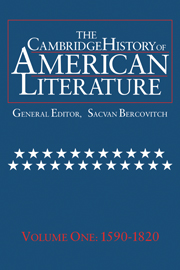Book contents
- Frontmatter
- Introduction
- THE LITERATURE OF COLONIZATION
- NEW ENGLAND PURITAN LITERATURE
- BRITISH-AMERICAN BELLES LETTRES
- THE AMERICAN ENLIGHTENMENT, 1750–1820
- THE LITERATURE OF THE REVOLUTIONARY AND EARLY NATIONAL PERIODS
- 1 Letters of the Early Republic
- 2 Magazines, Criticism, and Essays
- 3 The Drama
- 4 Poetry
- 5 The Novel
- 6 Charles Brockden Brown
- 7 Washington Irving
- 8 James Fenimore Cooper
- Chronology
- Bibliography
- Index
1 - Letters of the Early Republic
from THE LITERATURE OF THE REVOLUTIONARY AND EARLY NATIONAL PERIODS
Published online by Cambridge University Press: 28 March 2008
- Frontmatter
- Introduction
- THE LITERATURE OF COLONIZATION
- NEW ENGLAND PURITAN LITERATURE
- BRITISH-AMERICAN BELLES LETTRES
- THE AMERICAN ENLIGHTENMENT, 1750–1820
- THE LITERATURE OF THE REVOLUTIONARY AND EARLY NATIONAL PERIODS
- 1 Letters of the Early Republic
- 2 Magazines, Criticism, and Essays
- 3 The Drama
- 4 Poetry
- 5 The Novel
- 6 Charles Brockden Brown
- 7 Washington Irving
- 8 James Fenimore Cooper
- Chronology
- Bibliography
- Index
Summary
From 1790 to 1820, there was not a book, a speech, a conversation, or a thought in the state.” So wrote Ralph Waldo Emerson in 1852, glancing back from the heyday of Romanticism to what he considered the cultural blankness of the formative years. Until the 1980s, academic criticism accepted and elaborated this pejorative assessment of postrevolutionary culture. To modern readers, there seemed little to admire in the letters of the early Republic apart from its political documents. The consensus held that the literature produced by Americans before Washington Irving and James Fenimore Cooper was derivative of English models, lacking in originality and individual expressiveness, and fatally weakened by its commitment to didacticism. In effect, the consensus concurred with the Emersonian judgment that no literary art existed in this country until the awakening of the Romantic spirit.
This picture has now been revised, as new interest in the writing of the early Republic has brought fuller appreciation of that writing's goals and character, but it is instructive to reflect on the reasons for the persistent neglect of postrevolutionary culture. The supposition has been that the writing of the federal era defies sympathetic understanding because it lacks intrinsic merit. This objection assumes that all literature should be held to the same standard of evaluation. It takes for granted the existence of an ahistorical notion of what constitutes literary achievement, one that gives absolute primacy to aesthetic value. Yet the privileging of the aesthetic as something desirable purely for its own sake was itself the product – at least in America – of a historical configuration that postdated the early national period.
- Type
- Chapter
- Information
- The Cambridge History of American Literature , pp. 539 - 557Publisher: Cambridge University PressPrint publication year: 1994

